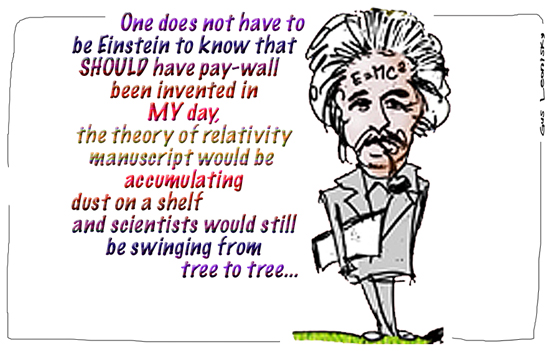Search
Recent comments
- patriotism....
7 hours 2 sec ago - belittling russia......
7 hours 27 min ago - Запад толкает Украину на последнюю битву....
7 hours 41 min ago - fourteen points....
7 hours 50 min ago - der philosophische glaube....
8 hours 1 min ago - seriously?...
8 hours 15 min ago - AfD....
8 hours 43 min ago - undesirables...
8 hours 59 min ago - assistant spies......
9 hours 24 min ago - brics.....
12 hours 32 min ago
Democracy Links
Member's Off-site Blogs
the dustbin of knowledge

On July 19, 2011, Aaron Swartz, a computer programmer and activist, was arrested for downloading 4.8 million academic articles. The articles constituted nearly the entire catalogue of JSTOR, a scholarly research database. Universities that want to use JSTOR are charged as much as $50,000 in annual subscription fees.
Individuals who want to use JSTOR must shell out an average of $19 per article. The academics who write the articles are not paid for their work, nor are the academics who review it. The only people who profit are the 211 employees of JSTOR.
Swartz thought this was wrong. The paywall, he argued, constituted "private theft of public culture". It hurt not only the greater public, but also academics who must "pay money to read the work of their colleagues".
For attempting to make scholarship accessible to people who cannot afford it, Swartz is facing a $1 million fine and up to 35 years in prison. The severity of the charges shocked activists fighting for open access publication. But it shocked academics too, for different reasons.
"Can you imagine if JSTOR was public?" one of my friends in academia wondered. "That means someone might actually read my article."
Academic publishing is structured on exclusivity. Originally, this exclusivity had to do with competition within journals. Acceptance rates at top journals are low, in some disciplines under 5 per cent, and publishing in prestigious venues was once an indication of one’s value as a scholar.
Today, it all but ensures that your writing will go unread.
http://www.aljazeera.com/indepth/opinion/2012/10/20121017558785551.html
- By Gus Leonisky at 6 Oct 2012 - 2:22pm
- Gus Leonisky's blog
- Login or register to post comments
pay-walls in the butt...
I have encountered pay-walls many times while searching for good solid scientific analysis on many subjects... It's a pain in the butt... In the case of say someone like Albechtsen, a pay-wall is a blessing... Only the obnoxious rich people would read her columns — and not read really but claim to have read them. Thus ill-informed rat-bags like Janet's and Mr Murdoch's own desire for enrichment is a blessing... It limits the numbers and the damage as whom is going to read the porkies...
But in regard to science, one can get frustrated to see the promise of a good source of information being hidden from view and basically never read by anyone else but a few peers... Up to the 1930s scientific knowledge was for the common good... Now it's seen as an EXTRA source of revenue... No wonder the churches and the mosques are gaining ground over scientific institutions...
paywall: entertainment (and news) behind closed doors...
Emmy Winners Mostly Fall Behind TV’s Pay Wall
It is the Gilded Age of Television.That became apparent at Monday night’s Emmy Awards when, once again, cable dominated the night.
A little like the privets of privacy that enclose billionaires’ estates in the Hamptons, pay walls sequester some of the best entertainment on television.
“Breaking Bad” on AMC won for outstanding drama, again, and its star Bryan Cranston won as lead actor for the fourth time. “Even I thought about voting for Matthew,” he said, referring to Matthew McConaughey, who was a favorite for his performance on the HBO show “True Detective.”
There is an exhilarating confluence of talent and opportunity at places like HBO and Showtime. Shows like “Breaking Bad” and “True Detective” are more inspired than movies, telling stories that are a complete vision rather than a committee-dulled compromise. But it’s increasingly obvious that the most rewarded series are also the ones that penalize audiences with costs that add up and count many viewers out.
read more: http://www.nytimes.com/2014/08/26/arts/television/cable-offerings-sweep-emmys-again.html?_r=0
See toon at top...